If you’re a bearded dragon owner, chances are you’ve asked yourself at some point: how long can a bearded dragon go without eating? Whether you’re dealing with a picky eater, sudden appetite loss, or the mysterious slowdown that comes with brumation, it can be stressful not knowing what’s normal and what’s not.
Understanding how long a bearded dragon can go without eating is essential for keeping your pet healthy and safe. Unlike other reptiles, bearded dragons can sometimes go days—or even weeks—without food depending on their age, environment, and health status. But when is it okay, and when should you worry?
In this guide, we’ll break down everything you need to know about this topic—from natural fasting cycles to red flags that signal a deeper issue. Whether you’re a first-time reptile keeper or an experienced beardie parent, this post will help you confidently assess what’s happening when your dragon skips a meal.
How Long Can a Bearded Dragon Go Without Eating?
Bearded dragons are known for their healthy appetites, so it’s natural to worry when they suddenly stop eating. In this section, we’ll explore how long a bearded dragon can go without eating, what’s considered normal, and when it becomes a cause for concern. Let’s break down the key factors that affect fasting periods across different ages and situations.
Average Fasting Periods for Adult vs. Baby Bearded Dragons
Bearded dragons can go without food for different lengths of time based on their age and development. Healthy adult bearded dragons can typically fast for up to two weeks without serious risk, especially during periods of low activity or brumation. Their slower metabolism and larger fat stores help them tolerate extended breaks between meals. However, access to clean water is essential during this time.
On the other hand, baby and juvenile bearded dragons require much more frequent feeding. Their fast-growing bodies and high energy demands mean they should eat daily and never go more than 24 to 48 hours without food. Prolonged fasting in young beardies can quickly lead to malnutrition, dehydration, or stunted growth.
Knowing the difference in fasting tolerance between age groups can help you recognize when something may be wrong. Always monitor your dragon’s behavior, weight, and hydration. If your beardie is skipping meals and you’re unsure why, it’s best to consult a reptile veterinarian.
If you’re caring for a young beardie, feeding frequency and setup are even more critical. Learn how to meet their exact needs in our baby bearded dragon care guide.
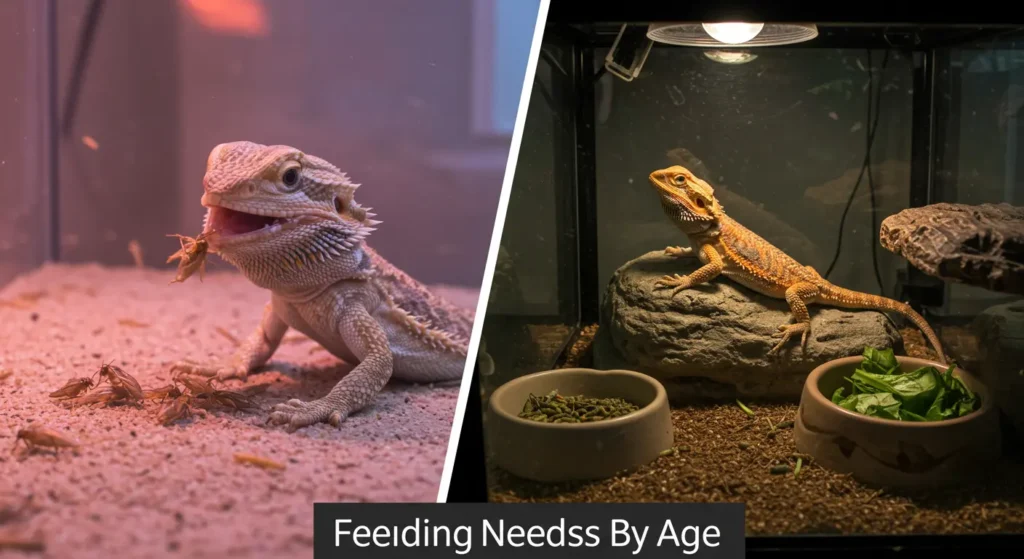
What’s Considered Normal Versus Concerning?
It’s not unusual for bearded dragons to skip a meal or two, especially after changes in their environment or during brumation. In many cases, a healthy adult may go without eating for a few days up to a week without showing signs of distress. This may happen during colder months, after relocation, or as a natural slowdown in their metabolism.
However, if your bearded dragon refuses food for more than 7–10 days, or if they’re also losing weight, appearing lethargic, or acting unusually, this may be cause for concern. For baby or juvenile dragons, even 2 days without eating is considered risky due to their nutritional needs.
It’s important to assess the full picture, including your dragon’s age, behavior, and overall health. Occasional fasting is often normal, but consistent appetite loss should prompt a closer look at their environment, diet, or possible health issues.
Situations When Not Eating Is Expected (e.g., Brumation)
There are specific situations where a bearded dragon’s lack of appetite is completely normal. The most common is brumation, a reptile’s version of hibernation. During this time, usually in the cooler months, bearded dragons slow down significantly. They may sleep for days, become less active, and eat very little—or stop eating entirely.
Other expected cases include relocation stress, seasonal changes, or after a major enclosure change. In these cases, a temporary dip in appetite is the body’s natural response to adjusting.
It’s important to observe your dragon during these times but not panic. As long as your bearded dragon appears otherwise healthy—alert when awake, hydrated, and not losing significant weight—short-term fasting is often harmless. Be sure to maintain optimal temperatures and lighting even during brumation or stress-related slowdowns.
When Does Fasting Become Dangerous or Life-Threatening?
Fasting becomes dangerous for a bearded dragon when it’s accompanied by signs of illness, weight loss, or dehydration. While adults can go up to two weeks without food in some cases, pushing beyond that—especially with visible health decline—can lead to organ stress, immune suppression, or even death.
For baby dragons, fasting is more urgent. Going more than 48 hours without food can quickly turn life-threatening due to their small size and rapid metabolism.
Warning signs that fasting has become dangerous include sunken eyes, black beard, unresponsiveness, bloating, or runny stools. If you notice these symptoms or if your dragon has not eaten in over 10 days, seek help from a reptile-savvy veterinarian immediately.
Catching these signs early can make a major difference in treatment success and overall survival.
Common Reasons Why Bearded Dragons Stop Eating
It can be worrying when your bearded dragon refuses to eat, especially if the cause isn’t immediately clear. In many cases, appetite loss is triggered by common, manageable factors in their environment or routine. Let’s explore the most frequent reasons why bearded dragons stop eating and what each one could mean for your pet.
Brumation and Seasonal Appetite Changes
Brumation is a natural state of dormancy that affects many reptiles, including bearded dragons. It typically occurs during the cooler months of the year and can last anywhere from a few weeks to several months. During brumation, your bearded dragon’s metabolism slows down significantly. As a result, they become less active, sleep more often, and show a sharp decline in appetite—or stop eating altogether.
This process is similar to hibernation and is not a cause for alarm if your dragon is otherwise healthy. Appetite loss during brumation is expected and should not be forced. Instead, monitor your dragon’s weight, hydration, and overall behavior.
Ensure the enclosure maintains proper lighting and temperature even during this period. If your dragon is inactive and refusing food but still appears alert and well-hydrated, brumation is likely the cause. However, if appetite loss happens outside the expected brumation season, further investigation is needed.
Improper Temperature or Lighting Setup
Bearded dragons rely on external heat and UVB light to regulate their body temperature and metabolism. If their enclosure is too cold or lacks proper lighting, digestion slows down, and appetite naturally decreases. Inadequate basking temperatures make it difficult for your dragon to process food, leading them to avoid eating altogether.
The basking area should typically range between 95°F and 110°F, depending on age. UVB lighting is equally essential, as it helps synthesize vitamin D3 and prevents metabolic bone disease. Without proper UVB exposure, your dragon may become lethargic and stop eating.
Double-check that your heat and lighting sources are functioning correctly and that the enclosure offers a full temperature gradient. Also, replace UVB bulbs every 6 to 12 months, as their effectiveness fades even if the light is still visible. Optimizing their environment often leads to a quick improvement in appetite.
Stress, Relocation, or Environmental Changes
Stress is one of the most common yet overlooked reasons bearded dragons stop eating. These reptiles are sensitive to changes in their environment, and even small disruptions can impact their appetite. Stress can be caused by relocation to a new home, changes in enclosure layout, loud noises, the presence of other pets, or frequent handling.
When stressed, a bearded dragon may hide more often, become less active, and reject food. This behavior is typically temporary but should still be monitored. Reducing unnecessary handling, maintaining a consistent feeding schedule, and providing a calm environment can help reduce stress levels.
If you’ve recently brought your dragon home or changed their enclosure, give them a few days to adjust. Appetite usually returns once they feel secure again. However, if food refusal continues for more than a week, it’s time to consider other causes.
Illness, Parasites, or Impaction Issues
When a bearded dragon is ill, one of the first signs is often a sudden loss of appetite. Conditions like internal parasites, impaction, or infections can all cause discomfort and disrupt their desire to eat. Impaction—often caused by loose substrate, large feeder insects, or dehydration—can block the digestive tract, leading to bloating, lethargy, and refusal to eat.
Parasites are also common, especially in dragons recently adopted or housed in unclean conditions. Symptoms may include runny stools, weight loss, or a swollen belly. Infections, such as respiratory illnesses or mouth rot, also lead to food refusal and should be taken seriously.
If your bearded dragon has not eaten for several days and shows additional symptoms, seek care from a reptile-experienced veterinarian. Early diagnosis and treatment can prevent more severe health problems. Regular fecal checks and clean husbandry practices help reduce the risk of illness.
How to Tell If It’s Brumation or a Health Issue
When your bearded dragon stops eating, it can be hard to tell if it’s a natural part of brumation or a sign of something more serious. While both situations involve reduced appetite and activity, the underlying causes—and how you respond—can be very different. In this section, we’ll explore the key differences to help you make an informed decision.
Key Signs of Brumation in Bearded Dragons
Brumation is a natural, seasonal slowdown in activity that many healthy adult bearded dragons experience. During this period, your beardie may sleep for long stretches, become less active, and spend most of its time in its hide. Appetite will decrease significantly, and some dragons may stop eating altogether. This behavior is normal if it occurs during late fall or winter, particularly in mature dragons.
Other signs of brumation include digging, hiding for days, or choosing cool spots in the enclosure. Despite the reduced activity, your dragon should still respond when handled and show no signs of illness. It’s also common for them to stop defecating due to reduced food intake.
Timing is key—brumation typically lasts anywhere from a few weeks to a few months. If your dragon exhibits these behaviors during cooler months but otherwise looks healthy and hydrated, brumation is likely the cause. Continue offering fresh water and maintain proper lighting and temperature during this time.
Symptoms That Suggest a Medical Issue
Not all appetite loss is harmless. If your bearded dragon stops eating and also displays signs like sudden weight loss, lethargy, or a bloated or swollen belly, it may indicate an underlying health problem. Unlike brumation, medical issues are not seasonal and can happen at any time of year.
Other red flags include a blackened beard, frequent hiding outside of brumation months, runny or discolored stools, mucus around the nose or mouth, and sunken eyes. These are often signs of impaction, parasites, or infections.
Unlike a brumating dragon, a sick bearded dragon may appear weak, uninterested in movement, or show discomfort when handled. In some cases, the dragon may seem unusually cold or unable to bask properly.
If you observe these symptoms, it’s important not to wait. Fasting due to illness should be addressed quickly to avoid complications. Consult a reptile-experienced veterinarian for diagnosis and treatment.
What to Monitor During a Fasting Period
When your bearded dragon isn’t eating, it’s essential to monitor specific indicators to determine whether the cause is brumation, stress, or illness. The most important factors to track include body weight, hydration status, and general behavior. Weigh your dragon weekly using a digital scale and keep a record of any loss.
Check for signs of dehydration, such as wrinkled skin, sunken eyes, or sluggish movement. A properly hydrated dragon should remain alert when awake and respond to touch. You can offer water through a shallow dish, a dropper, or a lukewarm bath if needed.
Also, note any changes in basking habits, hiding behavior, or stool consistency. A dragon that continues to bask and drink water while fasting is more likely to be in brumation or mild stress, rather than seriously ill.
Keeping a simple log of these observations can help you make informed decisions and give your vet a clearer picture if medical attention becomes necessary.
When to Consult an Exotic Veterinarian
Knowing when to involve a vet can make a huge difference in your bearded dragon’s recovery. If your dragon hasn’t eaten for more than 7 to 10 days, especially outside the brumation season, it’s best to seek professional advice. The same applies if you notice signs like weight loss, bloated abdomen, black beard, or unusual lethargy.
An exotic veterinarian can perform a physical exam, take stool samples, and order X-rays or blood tests if needed. They’ll help rule out serious conditions like impaction, metabolic bone disease, or parasites. Many beardie issues are treatable if caught early.
It’s also a good idea to schedule a vet visit if you’ve recently adopted your dragon and aren’t familiar with its normal behavior yet. Don’t rely on guesswork—exotic reptiles require specialized care, and waiting too long can result in complications.
If you’re unsure, it’s always safer to consult a vet rather than hope the issue resolves on its own.
What to Do If Your Bearded Dragon Isn’t Eating
If your bearded dragon isn’t eating, it’s important to take calm, informed steps rather than panic. In many cases, simple adjustments can help restore their appetite and overall well-being. This section covers safe, practical strategies you can try at home before seeking veterinary care.
Safe Methods to Stimulate Appetite
If your bearded dragon isn’t eating, there are several gentle techniques you can use to encourage them. One of the simplest methods is hand-feeding. Try offering food using tweezers or your fingers to help build trust and stimulate interest. Some dragons also respond better to movement—wiggling insects like crickets or dubia roaches may spark their hunting instinct.
Adjusting the feeding schedule can also help. Offer food during their most active time of day—usually late morning after they’ve had time to warm up under the basking light. Keep distractions low, and ensure the enclosure is calm and quiet during feeding time.
You can also try warming their food slightly to enhance the scent. Offering a treat item like a waxworm can work short term, but shouldn’t replace their regular diet. If your dragon begins eating even a small amount, it’s a good sign their appetite is returning.
Adjusting Heat and UVB Lighting Conditions
A bearded dragon’s digestion and appetite are directly tied to heat and UVB exposure. If their basking area isn’t hot enough, or if the UVB light is weak or improperly positioned, your dragon may stop eating altogether. Make sure the basking spot reaches between 95°F and 110°F, depending on your dragon’s age.
UVB lighting should be high-quality and replaced every 6–12 months, even if it still looks bright. The bulb should be mounted within the proper distance recommended by the manufacturer, usually 8–12 inches above the basking area, with no glass or plastic blocking the rays.
Check that your dragon has access to a proper temperature gradient—from a warm basking zone to a cooler retreat. This allows them to self-regulate and properly digest food. A simple thermometer and UVB meter can help verify that the setup is optimal. Often, correcting these environmental factors is enough to restore normal feeding behavior.
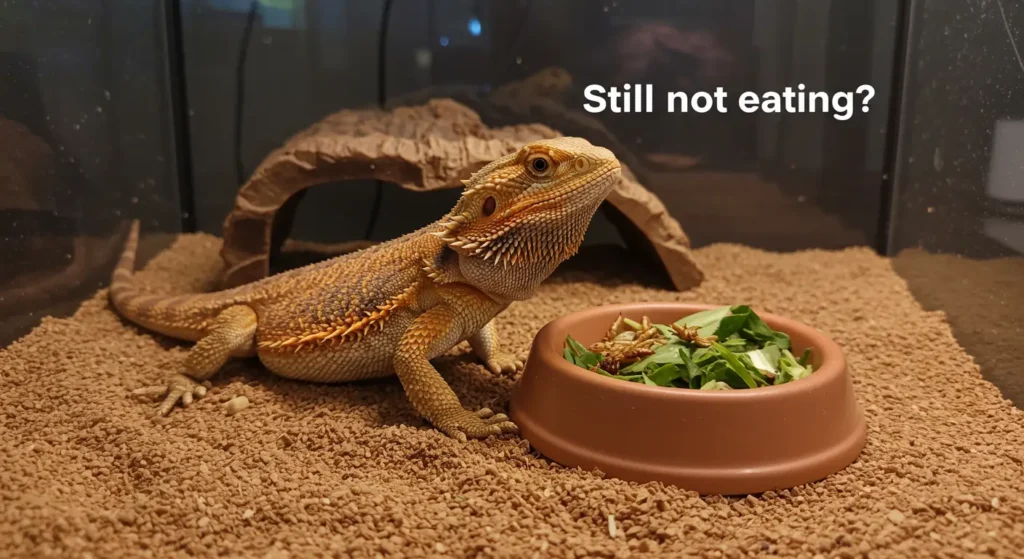
Trying Different Feeder Insects or Leafy Greens
Bearded dragons can get bored with their diet just like people do. If your beardie is turning down food, try rotating new, safe feeder insects such as dubia roaches, black soldier fly larvae, or hornworms. These are not only highly nutritious but often more enticing than standard crickets.
For plant-based options, experiment with collard greens, mustard greens, or dandelion leaves. Avoid iceberg lettuce, as it lacks nutritional value. You can also finely chop or mix greens with brightly colored veggies like bell peppers to catch their attention.
Presentation matters too—scatter feeders in a feeding dish, hand-feed with tongs, or allow movement in the enclosure to simulate hunting. Some dragons are more likely to eat if their food looks lively or different. Just ensure that anything you offer is safe, pesticide-free, and gut-loaded if applicable.
A little variety often goes a long way in reviving their interest in eating.
Hydration Tips and Using Rehydration Baths
Hydration plays a crucial role in your bearded dragon’s overall health and appetite. A dehydrated dragon may feel too weak or sluggish to eat, so restoring hydration should be a priority. Offer fresh, clean water in a shallow bowl daily, even if your dragon doesn’t seem to drink from it.
You can also mist their vegetables, which adds water content while encouraging food intake. For more direct hydration, rehydration baths are especially effective. Place your dragon in a shallow container of lukewarm water for 15–20 minutes. Let them soak and gently splash water near their mouth—many will drink this way.
Signs of dehydration include wrinkled skin, sunken eyes, and sticky saliva. If you notice any of these, increase hydration efforts immediately. Proper hydration often leads to a noticeable improvement in energy levels and appetite. If dehydration persists or worsens, consult a reptile vet to avoid complications.
Preventing Appetite Loss in the Future
Preventing appetite loss in bearded dragons starts with consistent, high-quality care. By focusing on proper nutrition, a stable environment, and routine health checks, you can reduce the chances of future feeding problems. In this section, we’ll cover the key habits that help keep your bearded dragon healthy and eating regularly.
Feeding Schedules Based on Age and Growth Stage
A proper feeding schedule plays a vital role in maintaining your bearded dragon’s health and appetite. Baby dragons (0–4 months old) should be fed 3 to 5 times per day, with a focus on protein-rich feeder insects like small crickets or dubia roaches. Their diet should consist of about 80% insects and 20% greens.
As they grow into juveniles (4–12 months), reduce feeding to 2 to 3 times per day, slowly increasing the portion of vegetables. By adulthood (12 months and older), most dragons do well with 1 feeding per day or even 5 meals per week, depending on their appetite and activity level. Their adult diet should shift to around 80% greens and 20% insects.
Feeding at consistent times also supports digestion and routine. Always offer fresh, properly sized food and remove uneaten items after 20–30 minutes. Keeping a feeding log can help track changes in appetite over time and identify potential problems early.
Creating a Healthy, Low-Stress Enclosure Setup
A well-designed enclosure can make a huge difference in your bearded dragon’s stress levels and overall appetite. Stress is a common trigger for fasting, but it’s often preventable with the right setup. Make sure the tank size is appropriate—at least 40 gallons for adults—to give them space to move comfortably.
Provide a basking area, a cool zone, and at least one hide for security. The lighting and temperature gradient should be consistent, with no sudden drops or exposure to drafts. Avoid placing the enclosure in noisy or high-traffic areas of your home.
Substrate choice also matters—opt for safe options like reptile carpet, tile, or paper towels to reduce impaction risks. Keep the enclosure clean and maintain a regular light-dark cycle of 12 hours each.
Consistency is key. When your dragon feels secure and comfortable in its environment, it’s more likely to maintain a steady appetite and exhibit healthy behaviors.
Gut-Loading and Using Supplements Properly
Gut-loading is the process of feeding nutrient-rich foods to feeder insects before offering them to your bearded dragon. This boosts the nutritional value of the insects and helps prevent deficiencies. Use fresh vegetables like carrots, collard greens, or squash to gut-load insects 12–24 hours before feeding them to your dragon.
In addition to gut-loading, proper supplement use is essential. Dust insects with calcium powder (without D3) at most feedings, and calcium with D3 a few times per week if your dragon doesn’t receive strong UVB light. Also, include a multivitamin supplement once or twice per week, depending on age and diet variety.
Avoid over-supplementing, which can cause health issues over time. Rotate supplements and follow product guidelines for dosage. These small habits build a strong foundation for your dragon’s immune system and support long-term appetite consistency.
Routine Checkups and Observing Behavior Changes
Regular health monitoring and vet checkups can help you catch problems early—before they affect your dragon’s appetite. Schedule an annual wellness exam with a reptile-experienced vet to check for parasites, metabolic issues, or early signs of illness.
In between visits, keep an eye on your dragon’s behavior. Watch for signs like sudden hiding, less basking, weight loss, or changes in stool consistency. These shifts may be early indicators of stress or disease.
Weigh your dragon weekly and record the data. Also, note changes in appetite or eating speed. By observing their routine closely, you’ll quickly recognize when something is off. Early action is key to preventing appetite loss and supporting a healthy, thriving bearded dragon.
FAQ
How long can a baby bearded dragon go without eating?
Baby bearded dragons have much faster metabolisms than adults and require frequent meals to support growth and development. They should not go more than 24 to 48 hours without eating. If your baby beardie refuses food, it could be a sign of stress, improper enclosure setup, or an underlying health issue. Because young dragons are more vulnerable to nutritional deficiencies and dehydration, any feeding issues should be addressed immediately. Monitor their weight, behavior, and environment closely, and consult a reptile vet if food refusal persists.
Is it normal for bearded dragons to stop eating during brumation?
Yes, it’s completely normal for a healthy adult bearded dragon to stop eating during brumation. This seasonal slowdown can last several weeks to months, during which they may sleep more, become less active, and show little to no interest in food. As long as your dragon is maintaining weight, staying hydrated, and showing no signs of illness, there’s usually no cause for concern. However, you should still offer water regularly and monitor their body condition throughout the brumation period.
Why is my bearded dragon not eating but still active?
If your bearded dragon is still alert and active but not eating, the issue may be minor. Possible causes include diet boredom, recent changes in their enclosure, or mild environmental stress. Check that the basking temperature, UVB lighting, and humidity levels are all within the recommended range. Offering a new variety of feeder insects or fresh greens can sometimes reignite interest in food. In many cases, appetite returns once the environment is stable and familiar again.
When should I worry about my bearded dragon not eating?
You should be concerned if your bearded dragon has not eaten for 7 days or more, especially if it’s not brumation season. Warning signs that require veterinary attention include weight loss, lethargy, sunken eyes, black beard, or a bloated belly. These symptoms could point to serious issues like impaction, parasites, or organ dysfunction. If you observe any of these, consult a reptile-experienced veterinarian promptly.
If your bearded dragon hasn’t eaten in over a week or shows signs of illness, it’s important to seek professional help. You can learn what to expect during a reptile checkup in this detailed guide by experienced reptile vets.
Can bearded dragons survive without food for a month?
Some healthy adult bearded dragons can survive up to a month without food, particularly during brumation. However, this is not considered healthy or normal outside of that specific context. Prolonged fasting should always be closely monitored, especially if the dragon is losing weight or showing other signs of distress. If your dragon hasn’t eaten for more than two weeks and it’s not brumating, it’s best to contact a qualified reptile vet for evaluation.
Conclusion
Understanding how long a bearded dragon can go without eating is essential for every responsible reptile owner. While short-term fasting can be normal—especially during brumation or minor stress—prolonged food refusal often signals a deeper issue that shouldn’t be ignored. Age, environment, hydration, and health all play a role in your dragon’s appetite, and knowing what’s normal versus concerning helps you take the right steps at the right time.
By staying observant, maintaining a stable enclosure, and acting quickly when red flags appear, you can prevent small issues from becoming serious health risks. If in doubt, always consult a reptile-savvy vet—your bearded dragon’s well-being is worth it.
Have you ever dealt with a beardie that refused to eat? Share your experience or tips in the comments below—we’d love to hear from fellow keepers!

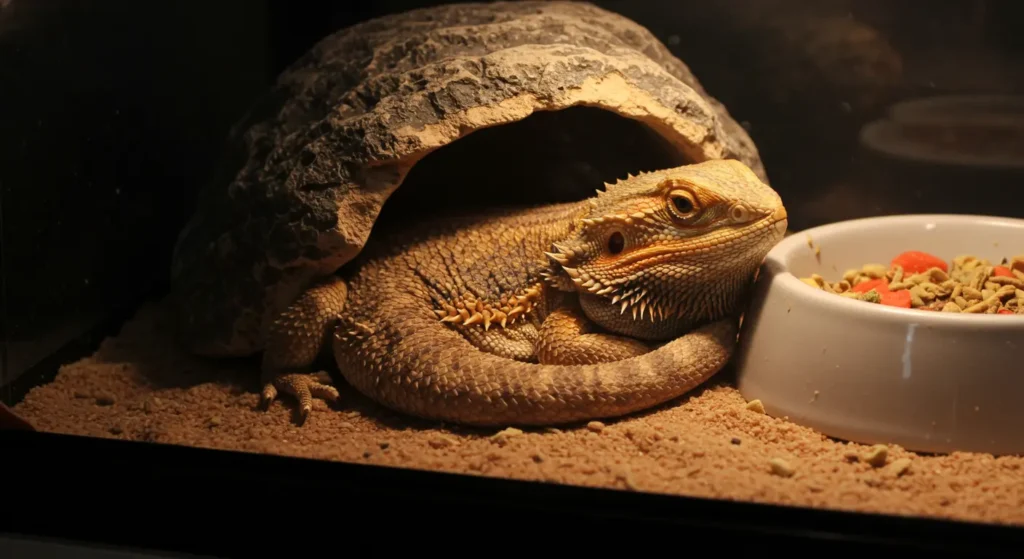
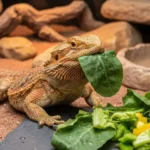
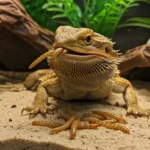
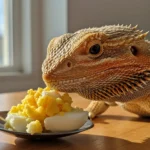
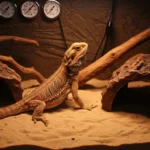
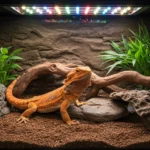
1 thought on “How Long Can a Bearded Dragon Go Without Eating: Guide”